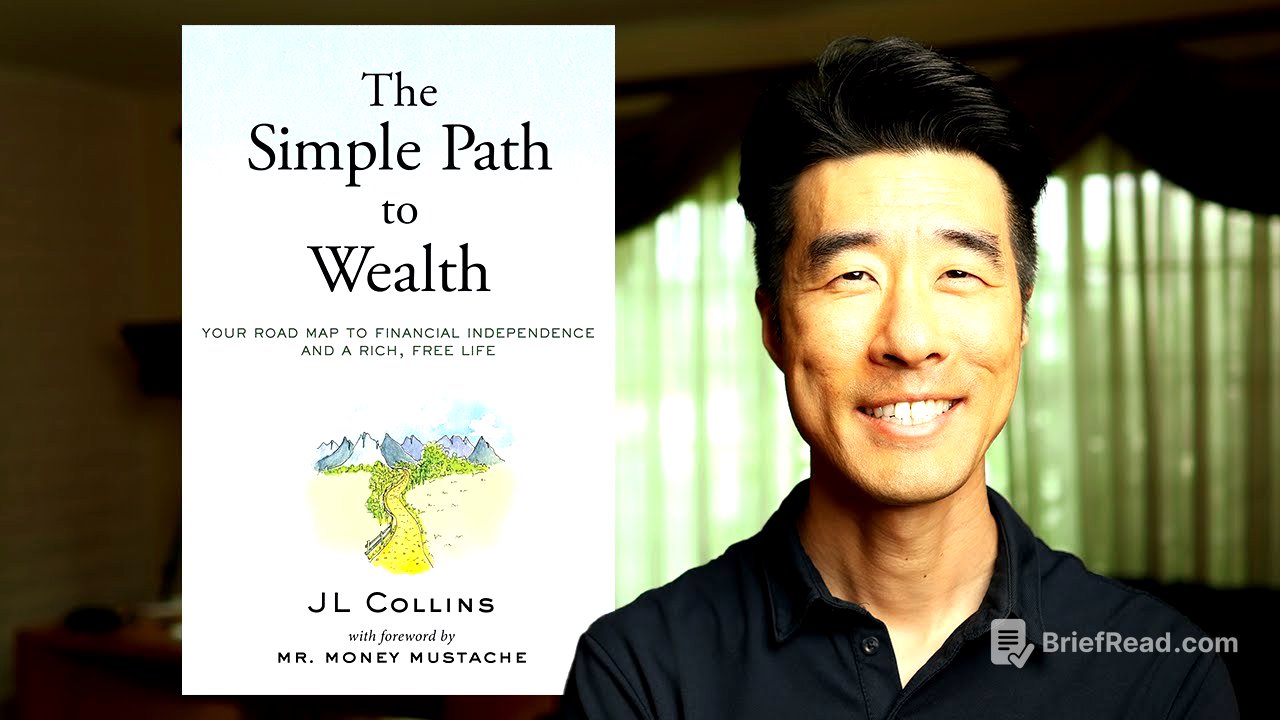TLDR;
This video summarizes 12 key takeaways from JL Collins' "The Simple Path to Wealth," focusing on building financial freedom through simple, effective strategies. It emphasizes understanding money, controlling lifestyle expenses, avoiding debt, and investing in VTSAX. The video also covers the importance of marrying well, avoiding financial advisors and stock picking, ignoring market news, and adjusting investment strategies based on life stages.
- Learn money and don't shy away from it.
- Freedom is the ultimate goal.
- Embrace simplicity in financial strategies.
- Invest in VTSAX for long-term wealth growth.
Intro [0:00]
The video introduces "The Simple Path to Wealth" by JL Collins as a highly influential book on the presenter's investing strategy. The presenter expresses admiration for the book and its author, sharing that they even traveled to England to meet Collins. The video will review 12 takeaways from the book.
Learn Money [0:25]
The first takeaway is the importance of learning about money. Money is a powerful tool for navigating the world, and mastering it can lead to financial freedom. Many people avoid learning about money due to its complexities, but understanding the basics is crucial. The book simplifies these concepts, making financial literacy accessible.
Freedom Is The Ultimate Goal [1:27]
The second takeaway emphasizes that the ultimate goal of learning about money is to achieve freedom. This includes the freedom to make choices, work for people you respect, and live life on your own terms. The goal isn't to amass wealth for show, but to gain the freedom to pursue personal fulfillment, spend time with family, or explore meaningful careers.
Control Our Lifestyle [2:44]
The third takeaway highlights the importance of controlling lifestyle expenses. The parable of the Monk and the Minister illustrates that true freedom comes from managing expenses rather than increasing income. It's crucial to track monthly spending and assess whether your lifestyle is helping you achieve financial freedom or enslaving you to a job or company.
Embrace Simplicity [3:46]
The fourth takeaway encourages embracing simplicity in financial strategies. Despite the financial media's tendency to overcomplicate wealth building, the path to wealth is simple: spend less than you earn, invest the surplus, and avoid debt. While simple, these steps require discipline and are often the hardest to implement.
Debt Is Not Normal [4:37]
The fifth takeaway challenges the notion that debt is normal. To achieve financial freedom, one must recognize debt as a destroyer of wealth-building potential. Debt is aggressively marketed through mortgages, car loans, and student loans, making it seem commonplace. However, it can cloud judgment and hinder financial progress.
Marry Well [5:43]
The sixth takeaway stresses the importance of marrying someone fiscally responsible. A life partner significantly impacts your financial life, even more than your career or income. Differing money values can lead to constant conflict. It's crucial to have open money conversations early in a relationship and regularly discuss budgets, net worth, and financial goals.
Avoid Financial Advisors [6:41]
The seventh takeaway advises avoiding financial advisors, as many prioritize their own interests. The financial industry often makes investing seem complex to sell advisory services. However, with basic knowledge, individuals can manage their investments effectively. Following the book's advice allows you to invest independently, ensuring your money is cared for by someone who has your best interests at heart.
Avoid Stock Picking [7:36]
The eighth takeaway warns against stock picking, describing it as a "sucker's game." Most people, including professionals, cannot consistently pick winning stocks. Using an analogy of martial arts, the speaker suggests that unless you're an expert like Warren Buffett, it's best to stick to indexing.
Avoid Market Timing [8:34]
The ninth takeaway advises against market timing. While buying low and selling high sounds simple, it's nearly impossible to execute consistently. Most people end up buying high and selling low due to panic or excitement. The stock market is influenced by numerous factors, making accurate predictions very difficult.
Ignore Market News [9:20]
The tenth takeaway recommends ignoring market news, especially financial market news. The speaker uses the analogy of "beer and foam," where the beer represents the underlying business and the foam represents short-term market news. Focusing on the foam distracts from the core fundamentals of the business. Market news networks profit from short-term volatility, which is not conducive to long-term wealth building.
Invest In VTSAX [10:32]
The eleventh takeaway advocates investing all your money in a single stock index fund, specifically the Vanguard Total Stock Market Index Fund (VTSAX). VTSAX historically beats most actively managed funds, has a low expense ratio, holds almost every publicly traded company in the U.S., and is self-cleansing, meaning failing companies are automatically replaced.
Wealth Accumulation vs. Wealth Preservation Stage [12:19]
The twelfth takeaway discusses different investing strategies for different life stages, specifically the wealth accumulation stage versus the wealth preservation stage. While VTSAX is recommended for wealth building, a bond fund like the Vanguard Total Bond Market Index Fund (VBTLX) can balance your holdings as you age. During wealth accumulation, a portfolio can be 100% stocks, but in retirement, a mix of stocks, bonds, and cash is advised to preserve wealth.









